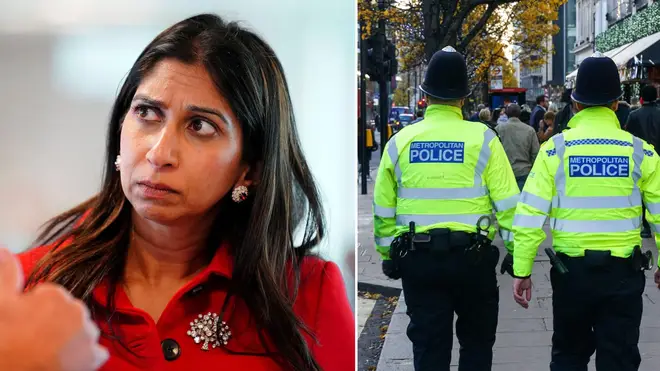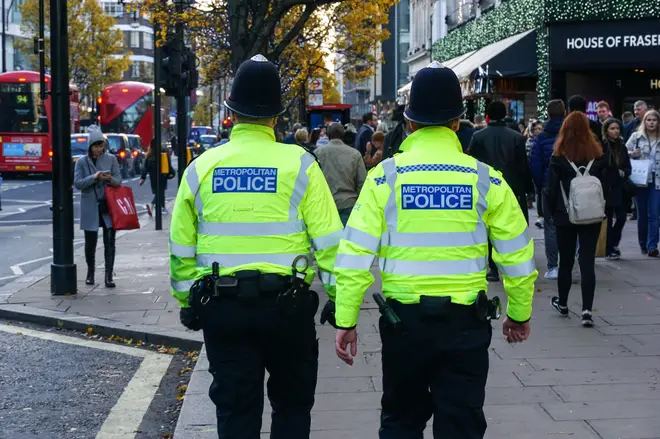
Clive Bull 1am - 4am
31 August 2023, 09:05

Rogue police officers face being sacked automatically if they are found guilty of gross misconduct.
Chief constables and senior officers will be able to dismiss bad apples in their force after years of incidents like Wayne Couzens and David Carrick who shook public confidence in forces.
They will also be able to challenge misconduct decsions they don't agree with. Cops who fail vetting checks will also be sacked.
The new reforms were first reported by LBC earlier this week.
Read more: Home Office set to make it easier for police chiefs to sack dodgy cops found guilty of misconduct
The Home Office carried out a review of the police disciplinary system in the wake of the Couzens and Carrick cases.
The Government wants to bring in the changes as soon as possible, with officials hoping they will be in place by next spring, it is understood.
The head of the police watchdog previously warned against making chief constables "judge and jury" in disciplinary hearings.

But the Police Federation of England and Wales (PFEW) said the system shake-up will see a return to the dark days with "kangaroo courts".
But Gavin Stephens, one of Britain's most senior officers as chairman of the National Police Chiefs' Council, welcomed the "sensible" plans.
Sir Mark Rowley, the head of the Met, has been pushing for force chiefs, rather than independent lawyers, to have the final say on which officers are sacked since he took on the role last year after estimating there were hundreds of rogue officers in his force - but the rules in place meant he was powerless to dismiss them.
Read more: Six former Home Secretaries write to Suella Braverman in support of police reform plans
He said: "I'm grateful to the Government for recognising the need for substantial change that will empower chief officers in our fight to uphold the highest standards and restore confidence in policing.
"The flaws in the existing regulations have contributed to our inability to fully address the systemic issues of poor standards and misconduct.

"Chief officers are held to account for the service we deliver and for the standards we uphold which is why I have been persistent in calling for us to have the powers to act decisively and without bureaucratic delays when we identify those who have no place in policing."
Lawyers known as legally qualified chairs (LQCs) were brought in to oversee police disciplinary panels in 2016 as part of efforts to make the system more transparent. But critics say the system is too slow and senior officers are more likely to sack those found guilty of wrongdoing.
Under the plans unveiled on Thursday, a finding of gross misconduct will automatically result in a police officer's dismissal unless exceptional circumstances apply.
Independent lawyers will continue to sit on the panel to advise and maintain "rigour", but now in a supporting role.
Home Secretary Suella Braverman said: "Corrupt police officers and those who behave poorly or fail vetting must be kicked out of our forces. For too long our police chiefs have not had the powers they need to root out those who have no place wearing the uniform.
"Now they can take swift and robust action to sack officers who should not be serving our communities."
Policing minister Chris Philp said confidence in forces has been "rocked" and "public trust must be restored", adding: "These changes will ensure that police chiefs will have the ability to act fast to remove officers guilty of serious misconduct or who are poorly performing."
The outcome of the hearings will still be determined by a majority panel decision and continue to take place in public.
Government officials are looking at creating a list of criminal offences that would automatically amount to gross misconduct upon conviction and are also exploring the idea of expanding the rights of police and crime commissioners to challenge disciplinary decisions to make sure chief constables are being held to account for their rulings.
Echoing his claims, PFEW national chairman Steve Hartshorn said: "Chief constables presiding once again over misconduct hearings is a huge retrograde step during a pivotal moment where we are looking to improve the service and restore public confidence.
"Legally qualified chairs were introduced for sound and legally reasoned judgments, reduced appeals, fair and consistent decisions, greater transparency and increased public confidence. It was a system which was working, and the Government should have taken steps towards strengthening the role of LQCs, who were unbiased and free of undue political and social pressures.
"A return to the dark days, a return to kangaroo courts, whereby an officer is already guilty in the eyes of the chief officer before any evidence is heard, and they already know what outcome they want to see, is deeply concerning."
Shadow home secretary Yvette Cooper said: "Labour has been calling for over two years for the complete overhaul of the police misconduct and vetting systems and these reforms are long overdue.
"But as well as being too slow, the Conservatives are also not going far enough to raise standards, root out abuse and restore confidence in the vital work the police do to keep communities safe."